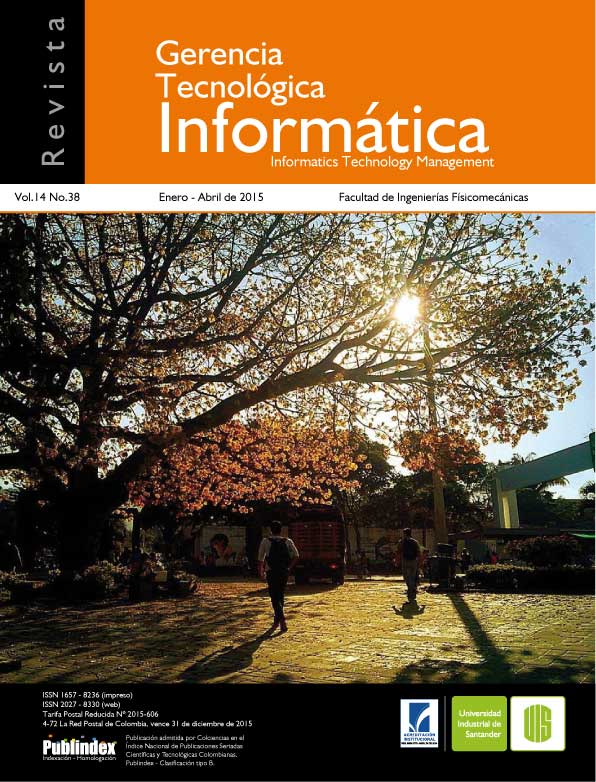Publicado 2014-11-18
Cómo citar
Resumen
En este artículo, se presenta un algoritmo que garantiza la calidad del servicio basado en capacidad
para la selección de un punto de acceso inalámbrico en una red 802.11. Este problema es modelado
como un juego no cooperativo basado en restricciones de ancho de banda donde los jugadores son los usuarios quienes de forma egoísta se conectan al punto de acceso (AP) que le garantice la calidad de servicio desde la perspectiva exclusiva de la capacidad mínima requerida para desempeñar el servicio requerido en la red. Para ello, se introduce el concepto de solución conocido como Equilibrio de Satisfacción (ES) y posteriormente se propone un algoritmo desarrollado en Matlab® que permite
al dispositivo de red determinar a cuál de los posibles AP disponibles debe conectarse, superando las
tasas de transferencia requeridas para realizar sus tareas necesarias en la red y por consiguiente,
garantizando calidad de servicio (QoS) desde la perspectiva de mínima capacidad requerida, mediante
restricciones de ancho de banda.
PALABRAS CLAVES: Ancho de Banda, Equilibrio de satisfacción, Juegos no Cooperativos, QoS,
Redes 802.11, Teoría de Juegos.
Descargas
Referencias
- SEN, S., ARUNACHALAM, K., WERNIK, basu y M., A QoS management framework for 3G wireless networks, En: WIRELESS COMMUNICATIONS AND NETWORKING CONFERENCE. New Orleans, LA, 1999.
- GUO, M., JIANG, S., GUAN, Q. y MAO, H. Provisioning of QoS adaptability in wired-wireless integrated networks. Communications and Networks, vol. 15, nº 1, pp. 61 - 70, 2013.
- KONDO, T., YOKOYAMA, A. y MAEDA, K., An implementation and evaluation of a selective QoSaware mobile multicasting on multiple wireless networks, En: Mobile Computing and Ubiquitous Networking (ICMU), 2014 Seventh International Conference on, Singapore, 2014.
- MISHRA, M. y SAHOO, A., An 802.11 Based MAC Protocol for Providing QoS to Real Time Applications, En:Information Technology, (ICIT 2007). 10th International Conference on, Orissa, 2007.
- SHOREY, R., ANANDA, A., CHAN, M. y OOI, W., QoS Provisioning in IEEE 802.11 WLAN, New York: Wiley-IEEE Press, 2005.
- ASTAIZA, E., BERMÚDEZ, H. F. y TRUJILLO, D. L. Selección de access point en redes inalámbricas 802.11 garantizando mínima QoS. Ingeniería y Ciencia,vol. 10, nº 20, pp. 115-137, 2014.
- PERLAZA, S., TEMBINE, H., LASAULCE, S. y DEBBAH, M. Satisfaction Equilibrium: A General Framework for QoS Provisioning in Self-Configuring Networks. En: IEEE GLOBAL COMMUNICATIONS CONFERENCE (GLOBECOM). Miami, 2010.
- ROSS, S. y CHAIB-DRAA, B. Learning to Play a Satisfaction Equilibrium. En Computer Science Department. PLT Bdg, Laval University, Quebec, PQ, Canada, 2010.
- MITTAL, K., BELDING, E. M. y SURI,S. A gametheoretic analysis of wireless access point selection by mobile users.En Computer Communications,vol. 31, nº 10, p. 2049–2062, 2008.
- JIANG, L., PAREKH, S. y WALRAND, J. Base Station Association Game in Multi-Cell Wireless Networks. En: WIRELESS COMMUNICATIONS AND NETWORKING CONFERENCE2008. WCNC 2008. IEEE, Las Vegas, NV, 2008.
- PERLAZA, S. M., BELMEGA, E.V., LASAULCE, S. y DEBBAH, M. On the Base Station Selection and Base Station Sharing in Self-Configuring Networks. En: FOURTH INTERNATIONAL CONFERENCE ON PERFORMANCE EVALUATION METHODOLOGIES AND TOOLS, Pisa, Italy, Oct. 2009.
- LI-HSING, Y., JIA-JUN, L. y CHE-MING, L. Stability and Fairness of Native AP Selection Games in IEEE 802.11 Access Networks. En: WIRELESS AND OPTICAL COMMUNICATIONS NETWORKS (WOCN), 2010 SEVENTH INTERNATIONAL CONFERENCE, Colombo, 2010.
- LIN, G., XINBING, W., GAOFEI, S. y YOUYUN,X. A Game Approach for Cell Selection and Resource Allocation in Heterogeneous Wireless Networks. En: SENSOR, MESH AND AD HOC COMMUNICATIONS AND NETWORKS (SECON), 2011 8TH ANNUAL IEEE COMMUNICATIONS SOCIETY CONFERENCE. Salt Lake City, UT, June 2011.
- ELIAS, J., MARTIGNON, F. y ALTMAN, E. Joint Pricing and Cognitive Radio Network Selection: a Game Theoretical Approach. En: MODELING AND OPTIMIZATION IN MOBILE, AD HOC AND WIRELESS NETWORKS (WIOPT), 2012 10TH INTERNATIONAL SYMPOSIUM. Paderborn, Germany, May 2012.
- TRUJILLO DÁVILA, D. L. Selección De Access Point En Redes 802.11 Garantizando Mínima Capacidad Para QoS: Una Perspectiva Desde La Teoría De Juegos No Cooperativos. Armenia Quindío, 2012, 110 p. Trabajo de grado (Ingeniero Electrónico). Universidad del Quindio. Facultad de Ingeniería. Programa de Ingeniería Electrónica. Grupo de Investigación GITUQ.
- OZDAGLAR, A. y MENACHE, I. Network Games. Theory, Models, and Dynamics. vol. 1, Morgan & Claypool, 2011.
- MONDERER, D. y SHAPLEY,L. S. Potential Games. Games and Economic Behavior,vol. 14, nº 44, pp. 124-143, 1996.
- AMZALLAG, D., BAR-YEHUDA, R., RAZ, D. y SCALOSUB, G. Cell Selection In 4G Cellular Networks, En: MOBILE COMPUTING, IEEE TRANSACTIONS,vol. 12, nº 7, pp. 1443 - 1455, 2013.
- MERTIKOPOULOS,P., BELMEGA, E., MOUSTAKAS, E. y LASAULCE, S. Distributed Learning Policies For Power Allocation In Multiple Access Channels. Selected Areas In Communications, IEEE Journal, vol. 30, nº 1, pp. 96 - 106, 2012.
- AHOURAI, F., TABANDEH, M., JAHED, M. y AFSARI, B. A Fair Routing Algorithm for Wireless Mesh Networks Based on Game Theory, En: ICN’09 EIGHTH INTERNATIONAL CONFERENCE, Gosier, Guadeloupe, 2009.
- DASILVA, L., BOGUCKA, H. y MACKENZIE, A. Game theory in wireless networks, Communications Magazine, vol. 49, nº 8, pp. 110- 111, 2011.
- FU, L., LIU, D., HE, Y., CUI, G., LIANG, H. y WANG, W. Cooperation Strategies by Cournot Game for Partner Selection and Power Control in S-UMTS, En: Computer and Information Technology (CIT), 2014 IEEE International Conference, Xi’an, 2014.
- ASTAIZA, E. Introducción A La Teoría De Juegos En Comunicaciones Inalámbricas. Armenia Quindío, 2013. 89 p. Trabajo de ascenso a categoría de profesor asociado. Universidad del Quindío. Facultad de Ingeniería. Programa de Ingeniería Electrónica.
- LASAULCE, S. DEBBAH, M. y ALTMAN, E. Methodologies for Analyzing Equilibria in Wireless Games. Signal Processing Magazine, IEEE , vol. 26, nº 5, pp. 41 - 52, 2009.
- COVER, T. y THOMAS, J. Elements of Information Theory, Second ed., Wiley, 2006.
- IEEE 802.11: WIRELESS LOCAL AREA NETWORKS. The Working Group for WLAN Standards, IEEE.
- YANG, S. C. OFDMA System Analysis And Design, Boston, Artech House, 2010, pp. 318.
- PÉREZ, J., JIMENO PASTOR, J. L. y CERDÁ TENA, E. Teoría de Juegos, Cap 3. Teoremas de Existencia del Equilibrio de Nash, Madrid, España: Pearson, 2004, pp. 170-175.
